What’s The Difference Between Keto And Carnivore Diet -Let’s Examine!
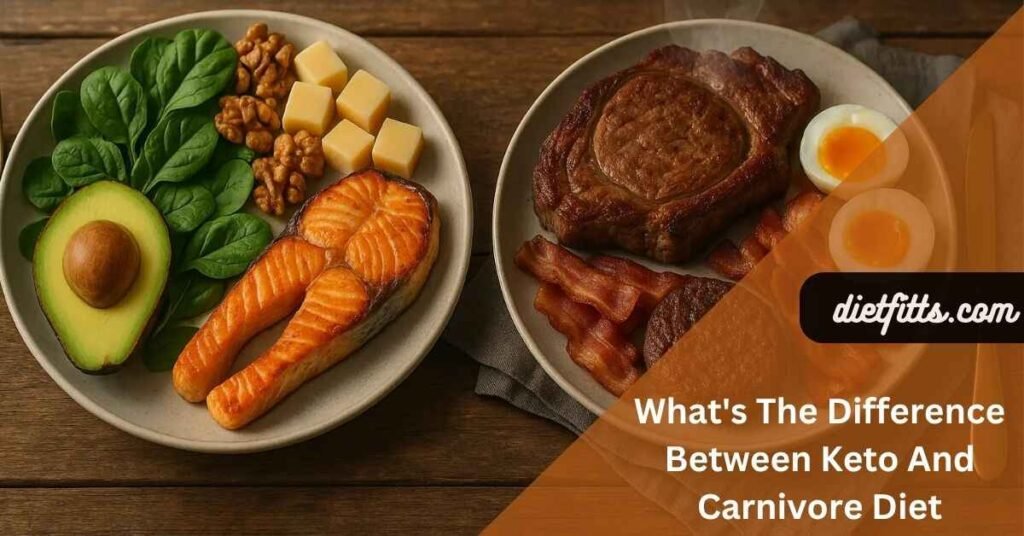
You might have heard about the ketogenic diet, which reduces carbs.? You may have also heard about the carnivore diet, where you mainly eat meat. Let’s Examine!
The main difference between the carnivore and keto diets is what you can eat. On the keto diet, you can have plants and plant-based foods. The carnivore diet only includes animal products. While the keto diet is low in carbs, the carnivore diet has no carbs at all when followed strictly. The best diet is the one you can maintain.
Both diets are becoming very popular, but they have pros and cons. Let’s look at keto and carnivore diets and see which might work best for you. So. Let’s get started!
Table of Contents:
What’s The Difference Between Keto And Carnivore Diet – Compare Difference!
Carnivore Diet:
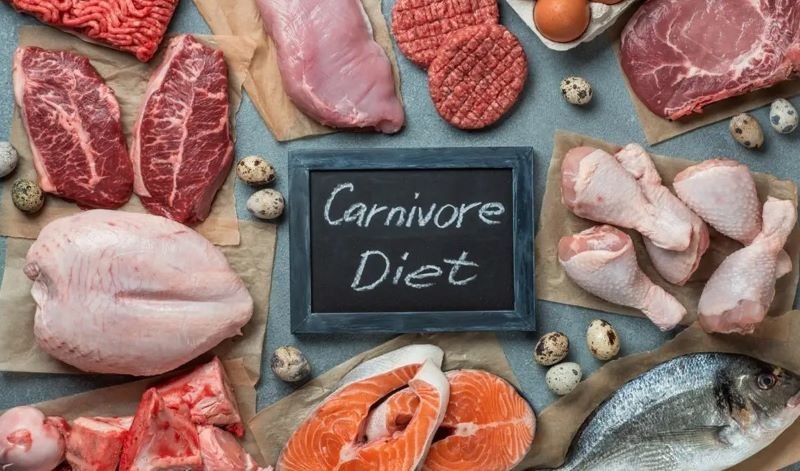
1. Diet Focus: Exclusively meat, fish, eggs, and some dairy products.
2. Carb Content: Zero carbs, excludes fruits, vegetables, nuts, legumes, grains, and seeds.
3. Dairy Restrictions: Must limit or avoid dairy with lactose to keep the diet zero-carb.
4. Energy Source: Fat and protein.
5. Guidelines: No specific rules for portion sizes, calorie counts, or meal frequency—eat when hungry.
5. Reported Benefits: Weight loss, improved overall health, and better cognitive function.
Keto Diet:
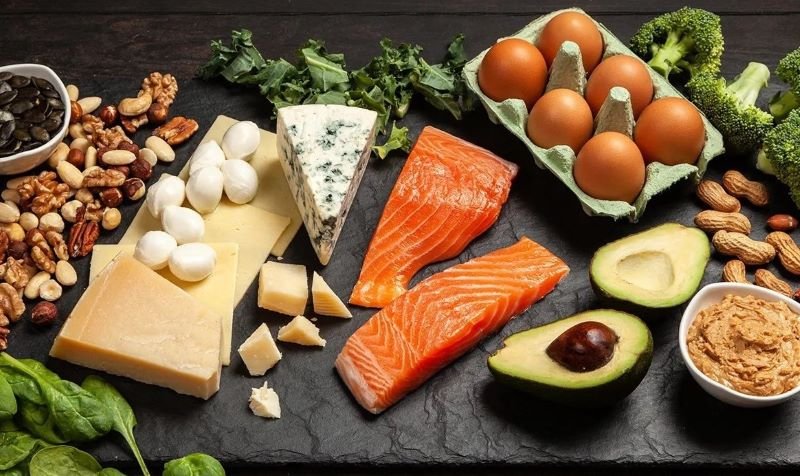
1. Diet Focus: Replaces carbs with fat for energy.
2. How It Works: Reducing carbs makes your body burn fat for fuel, creating ketones.
3. Metabolic State: The body enters ketosis, where it becomes efficient at burning fat.
4. Health Benefits: Can lower blood sugar and insulin levels, and help with weight loss.
5. Macronutrient Breakdown:
- Fat: 60-75%
- Protein: 15-30%
- Carbs: 5-10%
6. Diet Control: Maintaining a low-carb intake is crucial for staying in ketosis.
7. Reported Benefits: Weight loss and better blood sugar control.
Comparison Of The Keto And Carnivore Diets:
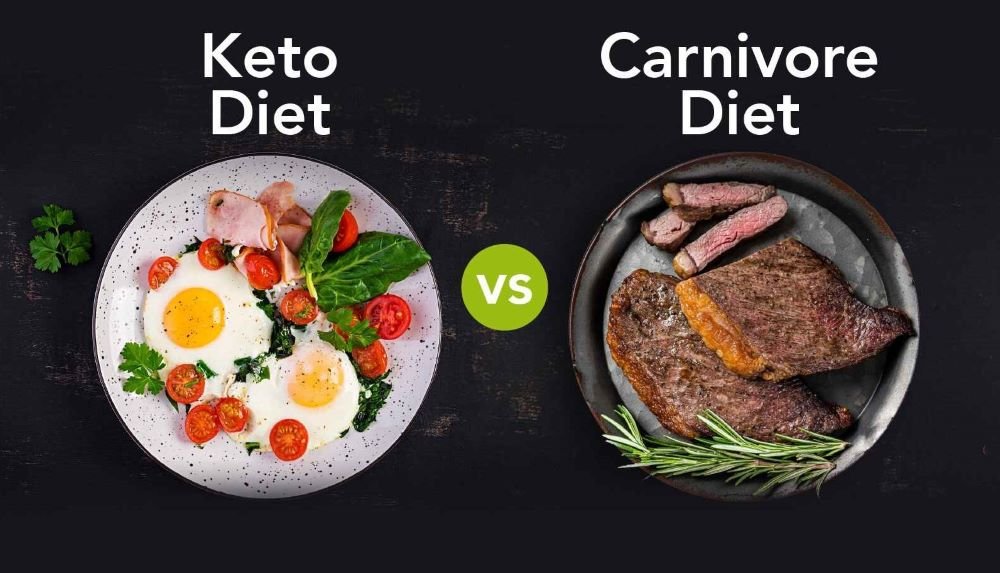
| Aspect | Keto Diet | Carnivore Diet |
| Calorie Intake | High-calorie intake | Lower calorie intake |
| Carbohydrates | Very low carb intake | Zero carb intake |
| Dietary Fiber | High fiber intake | Very low fiber intake |
| Fat | High-fat intake | Very high-fat intake |
| Protein | High protein intake | Very high protein intake |
| Sugar | Low sugar intake | Zero sugar intake |
Here you go, you have to learn about “What’s The Difference Between Keto And Carnivore Diet”. Stay with me as I share some facts about their similarities. For worldwide talk visit this Qoura website.
Keto And Carnivore Diet Similarities – Some Facts For You!
1. Both reduce carbohydrate intake:
While the carnivore and keto diets differ in how much carbs they allow—both drastically lower carbohydrate intake.
On a typical diet, people get about 50–75% of their calories from carbs because the body uses them for fuel. The keto diet reduces carbs to 5-10% of daily intake, while the carnivore diet aims for 0% carbs.

2. Both rely on fat for fuel:
Although the carnivore diet doesn’t have a specific macro breakdown like the keto diet, both use fat as the main energy source.
For people on the keto diet, the goal is to enter a state called ketosis, where the body burns fat for energy. In contrast, the carnivore diet doesn’t specifically aim for ketosis. Its primary focus is to eliminate all plant foods and keep carbs zero, naturally leading the body to burn fat for fuel.
3. Both may be effective for weight loss:
The keto and carnivore diets are popular mainly for their potential to help with weight loss. Many studies on the keto diet show it can help with weight loss and improve health over time. It has been proven to lower:
- body weight
- body mass index
- triglycerides
- LDL cholesterol
- blood sugar
At the same time, it increases HDL cholesterol.

Note: People on the keto diet for a long time generally don’t report significant side effects.
Fewer studies on the carnivore diet exist, but many share positive results online. One study suggests that cutting carbs and eating more protein might lead to better long-term weight loss. This could be more effective than diets high in protein and low in carbs.
Note: People on the carnivore diet might face issues like gut health problems. They could also experience diarrhoea or other digestive issues.
Which One Is Healthier? – Keto Or Carnivore!
It seems clear that the keto diet is a healthier long-term choice.
1. The carnivore diet claims benefits such as weight loss, improved mood, and better blood sugar control. However, it is very restrictive and may not be healthy for long-term use. Research needs to better support its benefits.
2. The carnivore diet is most effective as an elimination diet. Foods are reintroduced one at a time to identify food sensitivities.
3. Due to its restrictive nature, the carnivore diet may lack important nutrients and beneficial plant compounds. It also lacks fiber, essential for gut health and regular bowel movements.
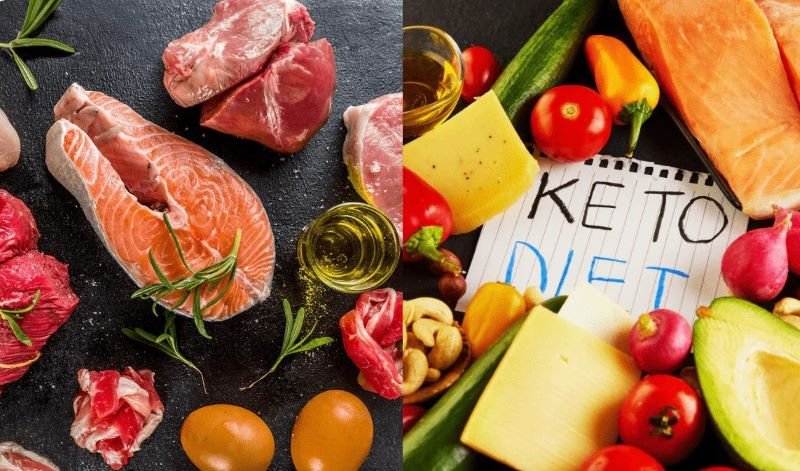
4. The keto diet is more balanced. It allows you to get the nutrients your body needs from various food groups. Studies have shown that it is safe for long periods.
5. Studies have shown that it is safe to follow a ketogenic diet for an extended period. However. The keto diet promotes:
- Weight loss
- Increases ‘good’ HDL cholesterol
- Reduces blood sugar
- Insulin levels
- Other health benefits
Read Also: Carnivore Diet Diarrhea – Take Control Of Your Health!
Both the carnivore and keto diets can be healthy. In my opinion, the keto diet offers more nutritious options, while the carnivore diet is more challenging to maintain due to its strict restrictions. Some clients don’t respond well to vegetables, often due to autoimmune issues. So I suggest the carnivore diet.
On the other hand, I recommend the keto diet to clients who want a more balanced diet or something sustainable long-term. In short, choosing a diet depends on your preferences and tolerance within dietary guidelines.
Keto And Carnivore Diet Risks – Have A Look!
1. Carnivore Diet Risks:
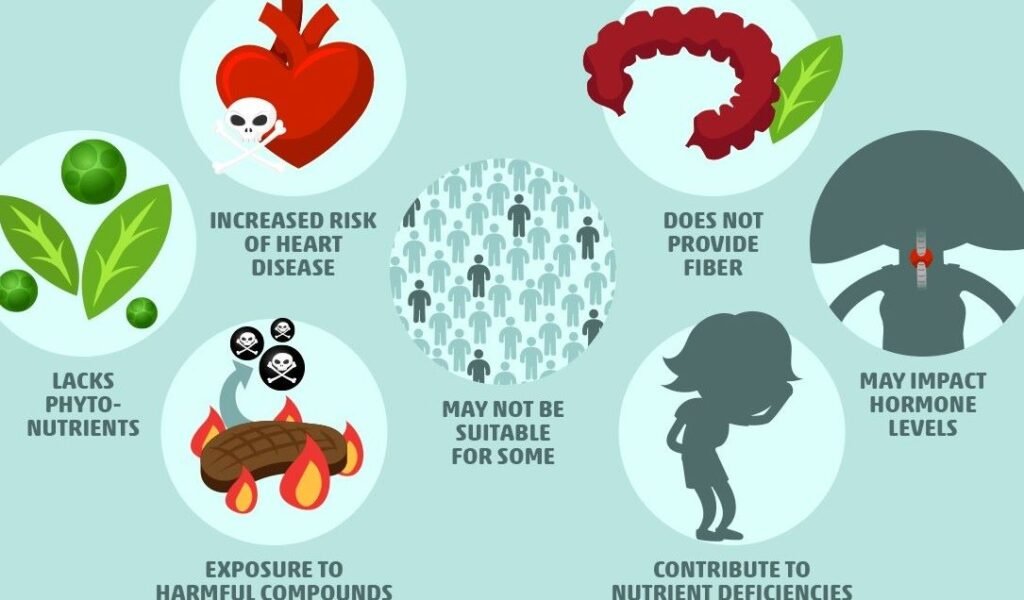
- Nutrient Deficiency: The carnivore diet eliminates most food groups. It can cause essential vitamin and mineral deficiencies in fruits, vegetables, and grains.
- Lack of Fiber: Fiber is essential for gut health and regular bowel movements. The carnivore diet, which cuts out all plant-based foods, lacks fiber entirely.
- Heart Disease: High consumption of red meat is linked to an increased risk of heart disease. This is due to high levels of saturated fats and cholesterol.
- Cancer Risk: Eating large amounts of red and processed meats can increase the risk of certain cancers, such as colorectal cancer.
- Kidney Damage: A diet high in protein can put extra strain on the kidneys, potentially leading to kidney damage over time.
- Increased Inflammation: Some studies suggest that a diet heavy in red meat can increase inflammation in the body.
Must Read: Why Carnivore Diet Is Bad – Don’t Compromise Your Health!
2. Keto Diet Risks:

- Nutrient Deficiency: The keto diet limits many fruits, vegetables, and grains. It can cause deficiencies in essential nutrients such as vitamins, minerals, and antioxidants.
- Keto Flu: As the body adjusts to a low-carb diet, some people experience “keto flu,” which includes symptoms like headaches, fatigue, nausea, and irritability.
- Low Blood Pressure: Rapid weight loss and reduced carbohydrate intake can cause low blood pressure, leading to dizziness and fainting.
- Kidney Stones: The keto diet’s high protein and fat intake can raise the risk of kidney stones.
- Constipation: The lack of fiber in the keto diet can cause constipation and other digestive issues.
- Nutrient Deficiencies: Because the diet is restrictive, it’s possible to miss out on important nutrients unless carefully planned.
- Impact on Existing Health Conditions: The keto diet can be harmful to those with gallbladder, thyroid, pancreas, or liver diseases.
Frequently Asked Questions:
1. Are Carnivore And Keto For Everyone?
No, the carnivore and keto diets are not for everyone. Both diets have potential benefits and risks. Individual suitability can vary based on health conditions, dietary preferences, and lifestyle. It’s important to consult with a healthcare professional before starting either diet.
2. Is carnivore diet the healthiest?
No! A restrictive diet could lead to unhealthy eating habits, says Zelman. The carnivore diet, like many other fad diets, is just a “quick fix,” according to Zelman. It’s very restrictive, unsustainable, and lacks evidence to support its claims.
3. How long does it take to get into ketosis on a carnivore?
The time it takes to enter ketosis varies for each individual. Generally, it can take 2–4 days if you consume 20–50 grams of carbs per day. However, some people might need a week or longer to reach this state.
Conclusion:
Both the keto and carnivore diets have benefits and risks. The keto diet is high in fat and low in carbs, effective for weight loss and blood sugar control. The carnivore diet centres on consuming only animal products. It eliminates plants, making it useful for identifying food sensitivities.
Both diets can be healthy if well-planned. However, the keto diet is generally more flexible and easier to maintain long-term.

Hi! I’m Olivia Steeve, a certified nutritionist with over 11 years of experience in the field of diet and nutrition. At DietFitts, I focus on providing scientifically-backed, practical advice to help individuals achieve their health and fitness goals through balanced eating. I share insights, tips, and personalized guidance to help you make healthier choices and live your best life.





